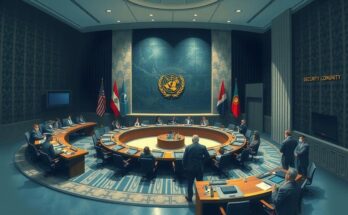The U.S. midterm elections faced limited foreign interference from Russia and Iran, largely due to ongoing conflicts in Ukraine and domestic unrest in Iran. Major General William Hartman noted a low level of activity from these nations, marking a change from previous elections. The newly established Cyber National Mission Force aims to bolster defense against cyber threats and foreign influence operations.
Recent U.S. midterm elections saw limited foreign interference from Russia and Iran, according to a senior American military official. Major General William Hartman, who leads the U.S. Cyber National Mission Force, expressed surprise at the minimal activity from these nations, particularly given past elections where foreign interference was notable. The ongoing war in Ukraine and domestic unrest in Iran hindered both countries’ capabilities to influence the U.S. vote.
Vladimir Putin’s focus on the war in Ukraine, with significant military and civilian casualties, diverted resources from any election meddling. Meanwhile, Iran’s leaders face widespread protests following the death of a young woman, which has culminated in severe crackdowns. This domestic strife limited both countries’ ability to engage in external influence operations during the elections.
Although potential interference from Russia, China, and Iran was considered, evidence of significant disruptive activity was largely absent. The FBI had alerted the public to threats from Iranian-associated cyber groups, but these concerns did not materialize into actionable interference. The Justice Department also announced charges against individuals linked to foreign surveillance activities, highlighting ongoing vigilance against such threats.
The Cyber National Mission Force was recently established as a sub-unified command, intended to strengthen U.S. military cyber capabilities. The initiative aims to develop superior technological expertise within the military, akin to the structure of the Joint Special Operations Command, which has achieved notable military successes in the past. General Hartman envisions a powerful cyber defense strategy to protect against foreign influence and cyber threats.
The force conducts proactive missions in allied nations to identify and mitigate threats to their networks. While Major General Hartman refrained from disclosing specifics about the force’s activities during the election, its role in defending against foreign influence has been emphasized as critical in maintaining the integrity of U.S. elections. The integration of military cyber expertise reinforces overall national security efforts.
The recent U.S. midterm elections experienced minimal interference from foreign actors, attributed to ongoing conflicts in Ukraine and domestic issues in Iran. Despite warnings of potential cyber threats, evidence of significant foreign meddling was largely absent. The establishment of the Cyber National Mission Force aims to enhance U.S. cyber capabilities and protect electoral integrity against evolving threats.
Original Source: muscatinejournal.com




